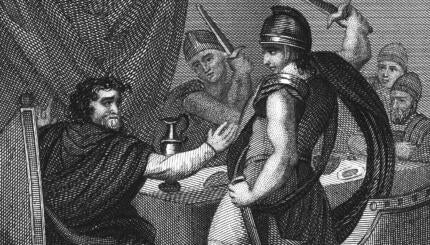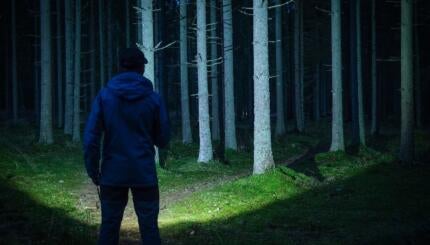Early in my career, I heard a story that has stayed with me for more than 30 years. “I used to love to go to shul with my grandfather when I was a boy,” it begins. “And one day, when he got to the Barchu (the opening call to worship which addresses God) and bowed forward in his seat, I asked him what he was saying. ‘I wasn’t talking to you,’ he said.”
I usually repeat this anecdote with humor, but it belies something deeper.
A grandparent speaking this way to a grandchild at prayer is risky business. It introduces exclusivity to the spiritual realm, proffers that the ability to talk to God belongs to a select few. On the other hand, there is also an implied playfulness to the grandparent’s pedagogy. “This is how I address God,” the grandparent might be saying. “If you want to talk to God, you have to ultimately find your own way in.”
I have been thinking this week about the implications of knowing and addressing God in different ways across time. In this week’s Torah portion, God tells Moses: “I am YHVH. I appeared to Abraham, Isaac, and Jacob as El Shaddai, but I did not make Myself known to them by My name YHVH.” God acknowledges that Moses knew God by a different name than the patriarchs.
With your help, My Jewish Learning can provide endless opportunities for learning, connection and discovery.
Rabbis, theologians, kabbalists and biblical scholars relish this kind of linguistic material, the verbal archaeology of Jewish life and thought spanning more than 3,000 years. The rule of thumb is that different times and circumstances require a variety of ways of engaging, or awakening, our awareness of the Divine.
These thoughts came to mind again later in the Torah portion as the text recounts God’s decision to confront Pharaoh and end the Israelites’ 400 years of slavery. “I have now heard the moaning of the Israelites because the Egyptians are holding them in bondage, and I have remembered My covenant … But when Moses told this to the Israelites, they would not listen to Moses, their spirits crushed by cruel bondage.”
This is truly one of the most loaded theological moments in the entire Torah, implying a kind of two-fold crisis between God and the Jews. God has only “now” heard the moaning of the Israelites? Where had God been for the prior 400 years of slavery? And what about the Israelites? Now that God was finally listening to their anguish, they could not listen to God because their spirits were crushed. Their suffering overwhelmed them.
As a rabbi, I often hear a version of this story as the reason why some Jews don’t believe, don’t go to synagogue, don’t pray. There is too much suffering in the world, the argument goes. Where is the God of the Bible who performs miracles and saves those in need? My own father used this as an excuse for not enrolling me in Hebrew school as a kid. A Jewish refugee from Minsk, after the Holocaust he concluded there was no God. Like countless generations before, I had to find my own way into the conversation.
Three teachers during my university years laid the groundwork.
One, a non-believing scholar of modern Europe, showed me patterns of history that revealed profound structural truths. As a refugee from Nazi Germany, his life represented, in the words of his partner, “triumph.”
A second was the son of Yiddish-speaking immigrants with a doctorate in English literature. His worldview was suffused with the music of language and literature, poetry and song, tragedy and humor. His acerbic wit, his warm heart and his Sabbath table were testimonies to a spirit that refused to be broken.
And the third, a rabbi, tutored me weekly in Jerusalem for an entire year. Like a hawk peering over his glasses, he hopped from shelf to shelf in his smoke-filled study, piling in my arms books to read, talk to and argue with over the coming week. When the year came to an end, he grabbed my shoulders, looked me in the eyes and said, “Go be a rabbi.”
I listened.
All three are long gone, but their various paths to wisdom remain the unconsumed bush of my learning, the ember always glowing with the potential to know more and teach more. Abraham knew God one way; Moses knew God another. A mother teaches a child one thing, a father teaches him another. Aunts and uncles, cousins and coaches, teachers of all grades — all have their own paths. There is always something to learn.
In our morning prayers, we address God as “compassionate Parent” and ask for the ability to “comprehend, discern, listen, learn, teach, practice and fulfill all the words of instruction in your Torah with love.” But like the Israelites, a broken spirit can block our path. God calls on Moses to break through this broken spirit, to defend a people who at that juncture could not hear God. It is a remarkable testimony to Moses’ faith and resilience that he does as God asks.
Sometimes we need to activate our faith with argument, with accusation. Writing from the hellscape of the Warsaw Ghetto, Rabbi Kalonymus Kalman Shapira confessed in his diaries, “How difficult has prayer become!” The rebbe admits that the Jewish institutions of his own time will not be rebuilt, that the hope for redemption is a future one. Grasping his own fate, he buries his diaries in milk cans so their discovery after the war could serve as a testimony of hope, letters to the future, covenants, conversations and arguments still alive — and therefore fulfilled.
These are troubling times for so many across our fragile globe. Too many suffer from dislocations and injustices, both natural and human-made. And yes, among us all are the broken spirits of individual souls whose lives are a testimony to the cruelty we are capable of inflicting upon one another.
But the Torah tells us that if our way of addressing each other is not working, we should choose another — find different words, adjust our approach, find new ways in. The truths are there, always waiting to be excavated from the ruins, reified by the eternal embers of their unextinguished wisdom.
This article initially appeared in My Jewish Learning’s Shabbat newsletter Recharge on January 25, 2025. To sign up to receive Recharge each week in your inbox, click here.



